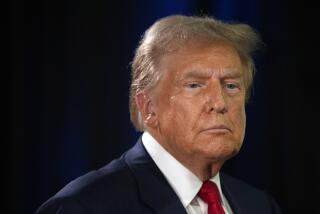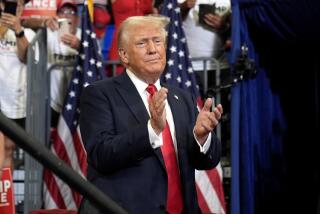Judge Deals Blow to Campaign Donor Case
- Share via
WASHINGTON — A federal judge threw out much of the government’s case against Thai American businesswoman Pauline Kanchanalak, delivering the latest in a series of legal blows to Atty. Gen. Janet Reno’s campaign finance investigation.
The ruling Thursday by U.S. District Judge Paul L. Friedman followed earlier decisions that gutted much of the prosecution’s cases against former Arkansas restaurateur Yah Lin “Charlie” Trie and Arcadia immigration consultant Maria Hsia, two other key figures in the Justice Department’s investigation into foreign contributions to the Clinton-Gore reelection effort.
Kanchanalak and her sister-in-law, Duangnet “Georgie” Kronenberg, were indicted last summer on 24 charges accusing them of illegally steering $659,000 to Democrats. Prosecutors dismissed six charges last fall after Friedman raised legal questions about them. The judge threw out 11 of the remaining counts Thursday, leaving just seven.
Unless the defense prevails on other motions before the court, Kanchanalak and Kronenberg will face trial March 8 on charges that they conspired to channel illegal contributions to the Democratic National Committee and various party candidates from 1992 to 1996. However, Friedman threw out allegations that they caused the filing of false statements concerning the donations with the Federal Election Commission. He said prosecutors failed to show that they played any significant role in the actual submission of statements to the FEC by the DNC and other political committees.
Friedman earlier dismissed similar charges concerning FEC statements in the cases against Hsia and Trie. He threw out five of six charges lodged against Hsia and three of 14 charges filed against Trie. Other rulings by the judge have created stumbling blocks for campaign finance prosecutors, including one last fall that held that citizens of foreign nations are prohibited only from making “hard money” contributions, or donations that directly support individual candidates for federal office. That ruling led prosecutors to act on their own to drop six charges against Kanchanalak and Kronenberg; only $80,000 of the money they allegedly provided Democrats was for “hard money” purposes.
Most of the investigations involving foreign contributions to the 1996 Clinton-Gore reelection have involved “soft money,” which was used by the Democratic Party for general purposes, such as issue advertising and voter registration drives. The Justice Department is appealing Friedman’s dismissal of the false statement charges in Hsia’s case, and a favorable ruling could lead to the counts being reinstated against Kanchanalak and Kronenberg.
More to Read
Get the L.A. Times Politics newsletter
Deeply reported insights into legislation, politics and policy from Sacramento, Washington and beyond. In your inbox twice per week.
You may occasionally receive promotional content from the Los Angeles Times.









